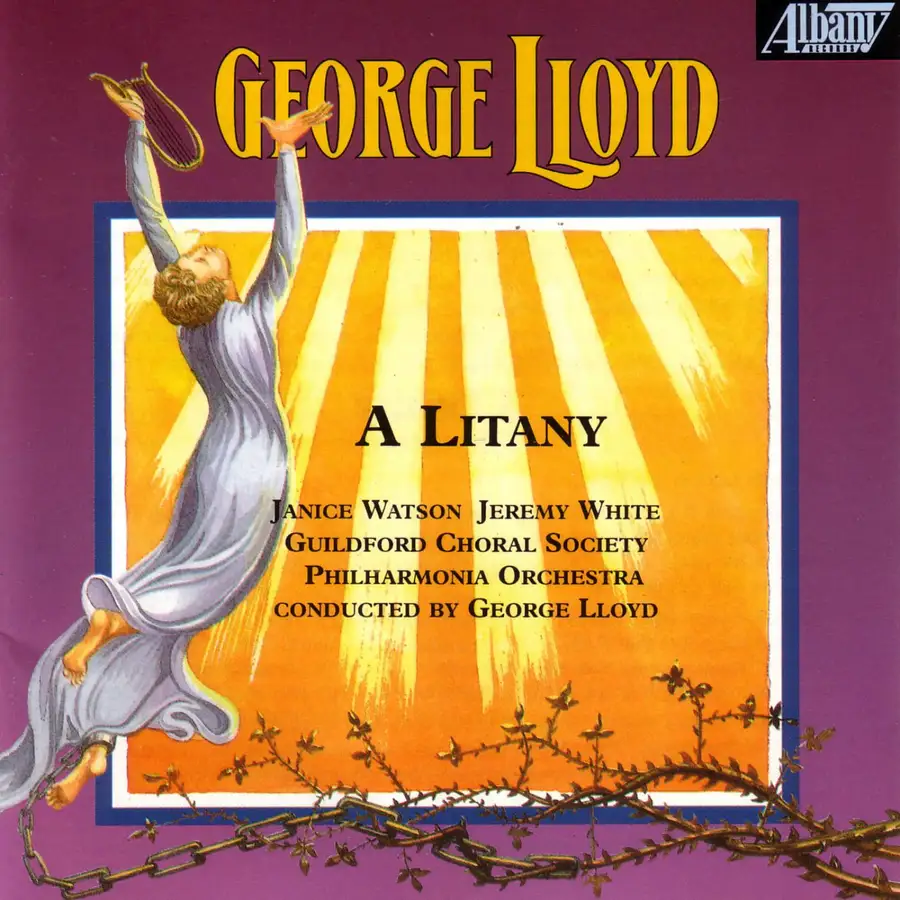A Mass for the Masses
In this case, 'Symphonic' refers as much to this work's secular intentions as it does to its orchestral forces and musical structure.
Not that this is an atheistic work; it is not. While George Lloyd has personally mentioned he did not attend a specific church, the composer was very much a believer.
Yet in the case of his A Symphonic Mass, Lloyd seems more concerned about setting words to music, than he is to any underlying religious meaning. I suppose any religious fervor the work stirs within any listener rests entirely upon that listener. I also suppose this would be true for any piece of music, sacred or secular.
Digressions aside, Lloyd's Symphonic Mass is a fully Romantic work, and should easily appeal to a wide audience. Any modernism is kept to a discrete minimum - I am looking at you, avant-garde spoken Kyrie portion. Overall, this music reminds me as an offshoot of the British pastoral school, full of sweeping melodies and bold orchestrations, not too far flung from that of Vaughan Williams or George Dyson.
There are many remarkable moments throughout its 60-minute runtime too. The haunting portions of the Gloria are pure musical-invention, where the rather bright tone of the Brighton Festival Chorus adds a youthful innocence to this movement. One is reminded of the score to Mad Max Beyond Thunderdome in places here, and I suppose Lloyd's cinematic musical voice bears some credence to a filmic experience. Listen to the broad tune towards the end of the Credo, and you will hear what I mean, although perhaps it is more operatic than filmic.
There are no vocal soloists involved; the chorus sings non-stop, except for a 3-minute orchestral-only Offertorium interlude, a quirky instrumental rest stop full of characterful percussion and string solos.
Overblown or a monumental experience? I suppose, it depends on one's tastes, yet I for one would relish a chance to hear this in concert, although I have no expectation of having such a chance given the rarity of such programming today.
For some reason, despite having really enjoyed A Symphonic Mass in its original Albany incarnation, I never picked up George Lloyd's 50-minute A Litany. A shame, for this work is as much of a wonderful musical experience as its partner on this new Lyrita set.
Here, its seems the composer is less a-feared of using dissonance for his own purposes. The opening choral paean is an immediate example, where the orchestra attempts to keep the work fixed amicably.
The starkest difference between the two works on this set is the use of soprano and baritone in A Litany. When the two vocal soloists meet in the extended finale, comparisons to Vaughan Williams' A Sea Symphony would be apt, methinks. I also thought of George Dyson's oratorios whilst listening, perhaps goaded by the use of John Donne's archaic poetry.
As to the soloists, Janice Watson's bright tone is glorious, reminding me of Yvonne Kenny in my favored recording of A Sea Symphony. Apparently, David Wilson-Johnson was slated to sing in this recording, and indeed this composition was written for his voice specifically. Instead though, we have baritone Jeremy White who, according to tales, recorded his part separately from these forces. One can tell sonically in the opening that this might be happening; a sort-of tinny removed quality. Moreso, I miss the richness of Wilson-Johnson in general; an unfortunate swap.
In any case, A Litany is another fine work from Lloyd. I am glad to have made its acquaintance, and look forward to getting to know it better. Its orchestrations are certainly just as interesting and colorful as his Mass, plus the addition of soloists affords the work some variety. The third movement a cappella setting is the crown-jewel of the work, especially considering the Guildford Choral Society has never been a favorite of mine. Here, they are powerful and effective throughout, with great choral unanimity.
Whereas
A Symphonic Mass ends in peace with its Dona Nobis Pacem text, A Litany
ends in spectacular fashion. The two works are a lovely complement to
each other, now put together in this 2CD set from Lyrita.
There has been some discussion on forums as to the new timings for these two works' reissues on Lyrita. The back cover (shown below) is of the old Albany timings. In reality, A Symphonic Mass comes in at 55 minutes 50 seconds instead of 60.44, and A Litany is 45.30 as opposed to the original 49.30. The fear is Lyrita unknowingly sped up the recordings upon transfer, albeit at a very small increment. I hope this isn't the case, but I am sure the squeaky wheels will get it fixed if needs be.
Otherwise, Lyrita has done George Lloyd a remarkable favor by reissuing most of his Albany recordings, in hopes of introducing his music to a new audience. No remasterings have been attempted, as far as I can tell at least, but these were high-quality recordings to begin with.
Listen on YouTube
Works
A Symphonic Mass (60.44)
A Litany (49.30)
Soloists
Janice Watson, soprano
Jeremy White, baritone
Performers
Brighton Festival Chorus
Guildford Choral Society
Bournemouth Symphony Orchestra
Philharmonia Orchestra
George Lloyd, conductor
Label: Lyrita
Year: 1993-96; 2024
Total Timing: 1.50.14
Terrific choral/orchestral settings, in terrific performances under the composer.
Hopefully these reissues will garner further appreciation of the Cornish composer.
Find more Lloyd recordings HERE!




Comments
Post a Comment